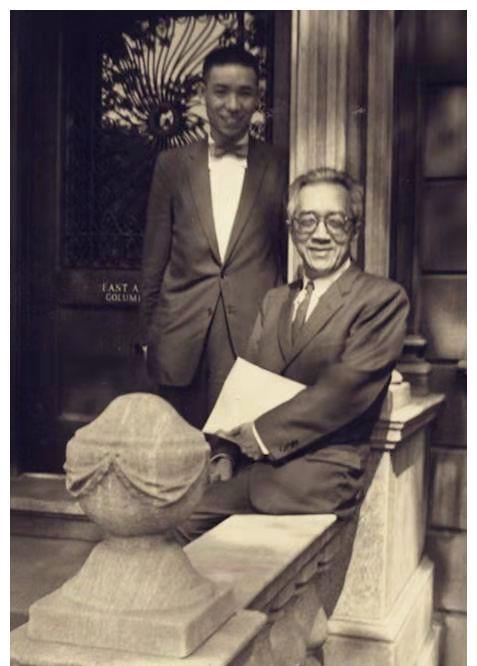
In 1958, Tang Degang took a group photo with Hu Shi at Columbia University when he made an "oral history"
The first oral history that Tang Degang made was the Oral Autobiography of Hu Shi. Overseas once popular "first look at Degang, then look at Hu Shi" saying, which proves the great influence of this work. At that time, Hu Shi was in exile in a foreign land, living a hard life, suffering from heart failure and stomach ulcers, although he had a pension, but the meager pension could not withstand the consumption of a serious illness.
Hu Shi's Oral Autobiography
Tang Degang claimed to be a small protégé of Hu Shi, but it should be clarified that Tang Degang was not referring to a student who received credits in the Eight Classics of Zheng'er, and in real terms, Tang Degang should be Hu Shi's apprentice grandson. The supervising professor of Tang Degang's college graduation thesis was Gu Jiegang, and Gu Jie was a student who had just listened to Hu Shi's class.
At that time, Hu Shi was going through the most frustrated, poorest, and most gray stage of his life. Tang Degang is not only Hu Shi's hometown in Anhui, but also a disciple of Columbia University, which naturally makes Hu Shi feel more cordial. They met at Columbia University's bicentennial celebration, and the two became acquainted.
Hu Shi has long advocated the preservation of historical materials through biographical writing. Throughout his life, he advised people to write biographies and autobiographies, believing that not only big people should write, but also small people should write, because this is the best way for ordinary people to preserve contemporary historical materials. Therefore, he was quite interested in doing oral history. However, after trying this new thing once or twice, the two found that oral history is not as simple as "you say I remember", recording, playback, transcription, proofreading, screening, addition, examination, etc., "the trouble is inexhaustible".
Tang Degang and Hu Shi took a photo when recording oral history
After all, Hu Shi was a professionally trained historian, and he made many pertinent suggestions to Tang Degang. For example, the extensive collection and familiarity with various biographical materials and related literature materials, the emphasis on the field investigation of relevant documentary materials, the examination of biographical materials, and especially the identification of forgeries, etc., have formed an important influence on the style of Tang Degang's oral historiography since then.
During the intensive oral phase, Hu Shi went to Columbia University two or three times a week morning, and after the end of the two, they would have lunch together. From Columbia's restaurant to a Chinese restaurant to a European-style restaurant in New York's East Side, during that time, the two almost "ate all the European-style small restaurants in New York's East Side."
Hu shi
Eating has the opportunity to make small talk, and in this process, Tang Degang has gained a lot. He later recalled that in the formal recording stage, what he had learned was limited, and what benefited him the most and understood Hu Shi the most was precisely what he had gained by chatting during meals. For example, in Hu Shi's early publication of "Miscellaneous Memories of the Southern Journey", Hu Shi's criticism of Chen Jitang, the "Southern Heavenly King" at that time, was only faint. "But when we were chatting, I asked him what he thought of the political situation in the southwest at that time, and as soon as the conversation box was opened, Hu Shi's criticism was very explicit." When talking about Xingnong, "Hu Shi also frankly said the details of his own life and the differences in thinking between the present and the past."
At this time, Tang Degang always cleverly led the topic to the part he wanted to explore, and let Hu Shi play as much as possible. The "Hu Shi Miscellaneous Memories" that we see now is exactly what Tang Degang wrote based on these "extra-record" records and memories.
"Hu ShiZayi", by Tang Degang, Guangxi Normal University Press
Readers who have read Hu Shi's Oral Autobiography will find that the annotated part of the book even exceeds the main text in length. This stems from the rules that Tang Degang set for himself: when the interviewer and the oral narrator have different opinions, the main text partially retains the interviewee's point of view in its entirety, while his own point of view is presented in the form of annotations.
In the annotations of Hu Shi's Oral Autobiography, there are not only confirmations, explanations, supplements, verifications or doubts about Hu Shi's oral contents, but also further analysis or comments on related contents, which are extremely rich. As a result, Tang Degang created a new paradigm of presenting the oral history of the oral narrator in its entirety in the main text and presenting his own views with annotations, making hu shi's oral autobiography a classic of modern oral history and laying the foundation for his position in oral historiography.